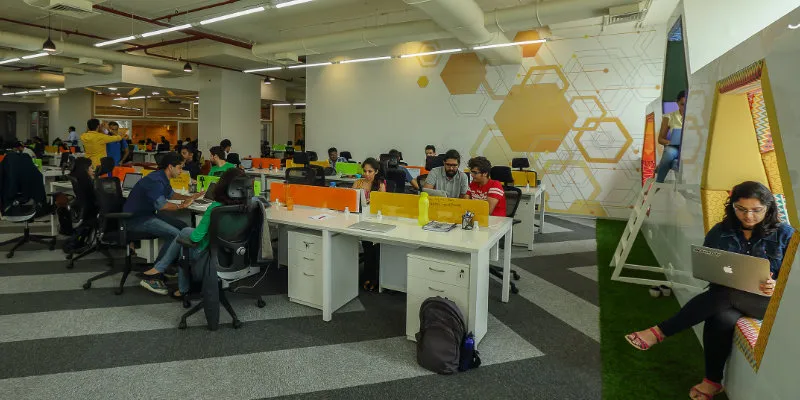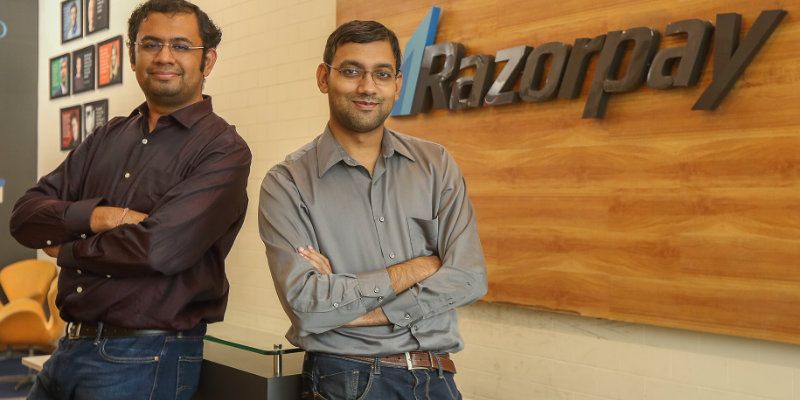Matrix Partners and Tiger Global-backed Razorpay takes the pain out of digital payments
The Bengaluru-based online payments platform is used by 35,000 merchants including small businesses, startups and other traditional organisations like schools, colleges, and training centres
Circa 2013. E-commerce was coming of age in India. But accepting payments online was still not easy. Registering with payment gateways took months. Technical integration at the merchant’s end proved cumbersome. The rate of payment failure was very high.
A first-hand brush with these problems prompted IIT Rourkee alumni Shashank Kumar and Harshil Mathur to work on solutions to take the pain out of online transactions. They launched Razorpay in 2013 with the aim of developing technology to solve challenges around payments in India.

Razorpay is a full-stack hassle-free payments platform that enables more than 100 payment modes along with advanced features like saved cards, link-based payments and more. The platform gets 15 percent of its volumes from link-based payments, which are mostly used by small merchants.
There are more than 35,000 merchants registered on the platform, including the likes of Videocon, GoIbibo, Zomato, Nykaa, Chai Point, Urban Clap, Nestaway, among others.
Over the past one year, Razorpay, which was selected for the prestigious Y Combinator programme, has witnessed a 25x growth in business and is still growing 30 percent month on month. It charges a fee of 2-4 percent of the value of transaction.
It raised a total of $11.5 million in funding from Tiger Global, Matrix Partners, MasterCard, and 33 angel investors including Snapdeal, InMobi and Freecharge founders, Visa’s Global Head of Strategy, Flipkart ex-CPO Punit Soni and internet entrepreneurs and investors Justin Kan and Tikhon Bernstam.
How they began
The duo had spent barely a year in their jobs – Shashank with Microsoft in the US and Harshil with Schlumberger, a US-based oilfield services company – when the startup bug bit them.
In 2014, they were working on a crowdsourcing portal when they became aware of the problems in registering with payment gateways, which required all kinds of documents and took months to complete the process. They found that the existing US-based payment systems such as Stripe were unsuitable for companies that wished to accept payments in India. So they set out to enable frictionless transactions with Razorpay.
Hailing from Patna, Shashank left his job with Microsoft. This, he says, was really a tough decision for him since he belonged to a middle class family. He shifted to Jaipur and stayed at Harshil’s parents’ home which later became a makeshift office of Razorpay.

A journey worth remembering
Razorpay was one of the lucky startups to avail the three months’ mentorship by Y Combinator (January to March 2014). Soon after, they raised funding and moved to Bengaluru. Their first office in Bengaluru was a rented house which also doubled up as their residence. Later, they briefly operated from a co-working space before finally moving to their new office in January 2016.
“Most of the startups start off from parent’s house, garage or college room. Nobody starts off with a proper office space as you don’t have the proper funding to set up a corporate office,” says Harshil.
Convincing banks to deploy the solutions of Razorpay was the biggest challenge the duo faced. Their non-financial background came in the way. They did the rounds of scores of banks before finally roping in HDFC Bank as their first client.
“Initially, it was very funny. Being 22-year-olds, we would visit bank branches in T-shirts and ask to be allotted a payment gateway and they would look at us as if something was wrong with us,” recalls Shashank.
Harshil too shares his encounters with banks. “Banks would tell us that since we were from non-financial backgrounds, we had no idea how this space operates. Then, I bought a proper suit, and had a proper business plan in place. Finally, we had learnt how to deal with bankers.”
Razorpay is a completely API-driven payment gateway which comes with plug-in and plug-out features. Just one or two lines of codes were needed in the application to get various payment options like debit/credit cards, netbanking, wallets, etc.
“At that point no one was focusing on optimising payment for 2G speeds. Bringing a payment gateway which is mobile first and is specifically designed for payments on 2G speeds or low network speeds on a small scale device was critical and this was one of the technical problems that we wanted to solve,” recalls Harshil
They claim that when UPI came out, they were the first payment gateway to launch support for UPI payments and went live with almost 600 merchants on day 1. Currently, they have about 7,000 merchants on UPI live and transacting. Similarly, when Jio Money was launched, they were able to add it and make it available for their merchant base.
Shashank and Harshil say that working out of a co-working space helped them to get their first set of customers – all they did was ask other startups if they needed a payment gateway and many eventually came on board. The duo also promoted Razorpay on multiple Facebook groups like Bangalore Startups, Pune Startups, and a lot of young startups hangout.

The road ahead
Razorpay has a team of 150 people and is currently present in Delhi, Mumbai and Kolkata. Around October-November this year, they are planning to launch new products. They plan to raise another round of funds next year and use that for expansion in the Middle East and Southeast Asia (Indonesia, Malayasia).
India is headed for an exponential increase in digital payments over the next few years. A Google-BCG report sees the industry growing 10-fold to touch $500 billion by 2020 and contribute 15 percent of India's GDP.
Aided in large part by the government’s demonetisation drive, India is set to become the third largest market for digital payments after the US and China. The country is expected to close 8-9 billion digital transactions in 2017 and reach 25 billion transactions by next year, according to the government.
With initiatives like Cashless India being pushed by the government along with the introduction of new payment modes like UPI, Aadhaar Pay, and USSD Payments, people and businesses alike are discovering the comfort of making payments online. Along with the exponential growth in e-commerce, other verticals like education, government, and utility sectors have now started to contribute massively towards building a digital economy.
Website: Razorpay






